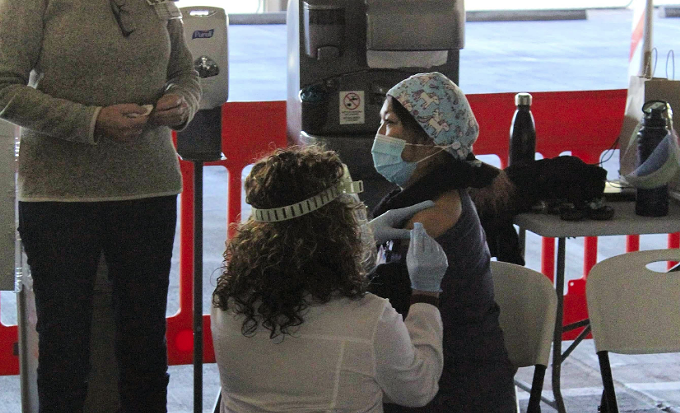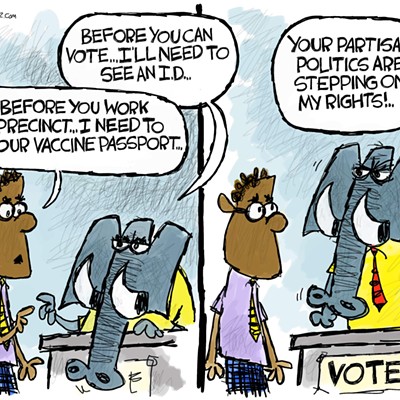Monday, April 12, 2021
UA Encourages Student Vaccination, Tackles Vaccine Hesitancy
The University of Arizona is encouraging students to get vaccinated before they travel outside of Pima County and, ideally, students should receive their first dose by Friday to be fully vaccinated come summer vacation, UA President Robert C. Robbins said on Monday morning.
“We want to vaccinate as many of our students as we can, prior to the end of the semester, with many students traveling out of state to return home for the summer, or to do programs outside of Pima County,” said Robbins. “We have a very limited window to administer the first dose for them to reach full vaccination before traveling, due to the wait time between doses.”
Last week, the university announced students could register for same-day vaccination appointments at either the student registration tent at the UA POD on Cherry Avenue open from 10 a.m to 8 p.m., or the CAT Ambassador Team Tent on the Mall in front of the Student Union.
Robbins said when speaking to students on campus, they found many are hesitant to receive the vaccine or want to talk to their family or friends before making an appointment.
Faced with hundreds of unfilled appointments daily, the UA POD is looking to tackle the barriers faced due to vaccination hesitancy.
“The choice before you isn't just vaccine or no vaccine,” said Dr. Deepta Bhattacharya, an associate professor of immunobiology in the College of Medicine who is leading the antibody test initiative at the university. "It's vaccine versus the chance of getting infected, then not only getting sick but then transmitting it to someone else who is at much higher risk."
He said the chance of a 25-year-old person dying from COVID-19 is one in 10,000, which he said sounds pretty good, but “I can guarantee you that if the vaccine caused one in 10,000 people to die, there is no chance it would be approved.”
Robbins said the data supports getting the vaccine as there have been a reduced number of hospitalizations and death due to COVID-19 alongside the rising number of vaccinations.
Former U.S. surgeon general and UA Task Force Director Dr. Richard Carmona also asked the public if they remember polio, measles, whooping cough or tetanus.
“These are all vaccinated diseases,” said Carmona. “Vaccines are arguably the most important discovery in science, in the history of mankind, because we've eradicated disease that is preventable, and this is just another disease that we're dealing with.”
While the university has administered 155,391 doses of vaccine as of Sunday has a low positivity rate of 1.7 percent among the students who are regularly tested, there has been an increase in the rate of transmission across the university-area ZIP code, the county and the state. A rate of transmission above 1 means COVID-19 will spread quickly. The state and ZIP code 85719, which surrounds the university, have reported a 1.02 rate of transmission for April 9.
For this reason, Carmona continues to push for continued vigilance and continued practice of mitigation strategies.
“The virus is still in the community and it is transmittable, that is the most important reason,” said Carmona.
Bhattacharya also warns of recurring mistakes that put us at risk.
“One of the mistakes we keep making over and over again is seeing what's happening in other parts of the country or the world and thinking that it won't happen here,” Bhattacharya said. “Every wave is then preceded by waves on the East Coast, in the Midwest and that's what we're seeing right now. So we have the opportunity to keep that down by maintaining these restrictions.”
He notes the decisions made by public health officials regarding the reopening of schools or extending mitigation measures have been thoughtful decisions and current restrictions are “reasonable measures to take to keep that wave from getting too bad here."
Bhattacharya also spoke on the efficacy of the vaccine against the variants seen across the country,
He notes that Johnson & Johnson reported 72% efficacy in their trial and 62% efficacy against the South African variant.
“That's within the same confidence interval,” Bhattacharya said. “What we are seeing from these vaccines is that they put you well above what we think are protective thresholds. So you can take a little bit of a loss in how well those antibodies stick, without really having very much of a real world consequence in how well they protect you from disease.”
While Pfizer and Moderna were released before the variants were widespread, he referenced a study done in Israel, which has made huge efforts in vaccinating its public, to support the efficacy of both vaccines. The study found slightly more breakthroughs of the South African variant (B.1.351)—the most problematic in terms of immune evasion—than the UK variant (B.1.1.7), which is generally thought to be more transmissible than the South African variant. However, he notes that the authors found no cases of the South African variant two weeks after a person had their second shot.
“They're very small numbers, then it's not something that you want to panic about either,” Bhattacharya said. “The likelihood that any of these variants that we know about right now completely evading immunity is zero. It's just not gonna happen, not yet.”
Further, Bhattacharya clarifies concerns of how long immunity will last as a six-month period has circulated in the media.
He clarifies that the reports state the vaccines can last “at least” six months, but that is a number based on the length of the trial.
“Now Pfizer has real-world data after six months, showing that the efficacy basically doesn't drop at all,” Bhattacharya said. “We know it's not only six months that's wrong. We know it's at least six months and likely much, much longer than that.”
Anyone 16 and older is eligible for vaccination at the UA POD. To register for an appointment visit podvaccine.azdhs.gov. For further assistance email covidhelp@arizona.edu or call 602-542-1000 for help in English or Spanish.
The UA POD is open for walk-in or drive-thru appointments from 10 a.m. to 10 p.m. seven days a week.
Antibody Test Initiative
University researchers are asking for participants to take an antibody test as part of an initiative with the state to better understand immunity to the virus that causes COVID-19.
Dr. Deepta Bhattacharya said, the study offers an opportunity to answer important questions about how long immunity lasts, whether from infection or vaccination, how many antibodies are required to achieve full protection against infection, and how many would place someone at risk, what affects levels of antibodies, and in turn, do symptoms correlate to the level of antibodies.
From research currently being conducted, they have already found a correlation between the severity of symptoms and the level of antibodies.
“If you got really sick, you had more antibodies than you did if you had very few symptoms or not at all,” explained Bhattacharya.
They also found a distribution of antibody levels across all groups, those with severe symptoms, fully vaccinated or asymptomatic.
“The question is what are the consequences if you're a little lower on the antibody side post-vaccine or a post-infection,” he asked. “Those are the questions that we'd really like to be able to answer through this antibody test.”
He also said the antibody test can answer questions about an individual’s immune system. The test can confirm whether an individual has a robust immune system after vaccination based on antibody production or individuals can learn if they ever had COVID-19, despite displaying no symptoms.
Students, employees and designated campus colleagues interested in participating in the study and getting an antibody test have until April 30 to visit the South Ballroom of the Student Union Memorial Center. They can register by visiting testing.wellcheck.arizona.edu and logging in with their NetID.
Anyone age 18 or older can find testing locations around the state and register at covid19antibodytesting.arizona.edu.














